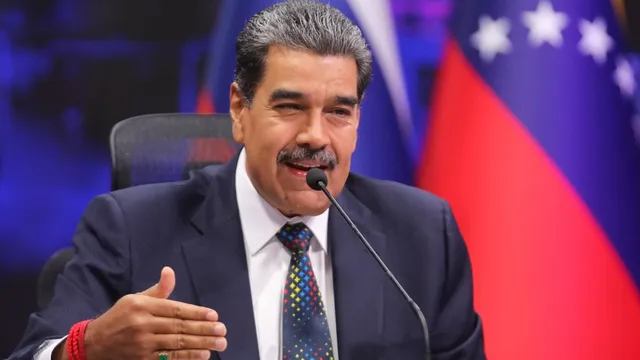
Trump imposes 25% tariffs on countries buying Venezuelan oil
2025-03-26 17:27- President Donald Trump announced a 25% tariff on countries purchasing oil or gas from Venezuela starting April 2, 2025.
- The tariffs aim to penalize nations that engage with Venezuela, which the Trump administration views as hostile and a source of criminal activity.
- This policy marks a significant escalation in U.S. economic measures against Venezuela and may influence global oil trade dynamics.
Express your sentiment!
Insights
In a significant policy change announced on March 24, 2025, President Donald Trump revealed that any country purchasing oil or gas from Venezuela will be subjected to a 25% tariff on all trade with the United States. This announcement was made via a post on Trump's Truth Social account. The tariffs are set to go into effect on April 2, 2025, a date Trump has referred to as 'Liberation Day.' Alongside this international tariff strategy, Trump emphasized Venezuela's alleged actions in sending criminals, including gangs designated as terrorists, into the United States. This move marks an escalation in the administration's approach to Venezuela, which has long been seen as hostile to U.S. interests, especially under the leadership of Nicolás Maduro. The newly introduced tariffs will not only target Venezuela but also provide a significant cost to any country that has economic dealings with the nation. Under this policy, nations that continue to import Venezuelan oil will face increased prices for their goods traded with the U.S. This tactic seems aimed at discouraging other countries, particularly major importers like China, which currently ranks as Venezuela's largest customer. The Trump administration previously sought to throttle Venezuelan oil revenues as a means of reinforcing economic sanctions while addressing immigration issues caused by Venezuelans crossing the U.S. border irregularly. As the Trump administration moves ahead with these tariffs, the implications for U.S.-Venezuela relations are considerable. Many are speculating about how these tariffs will impact global oil markets and prices, especially as the U.S. has been striving for energy independence. Trump has expressed his desire for the U.S. economy to thrive without relying on foreign oil, and by imposing tariffs, he believes that he can further enhance domestic production and push for fairer trade agreements worldwide. The announcement has sparked debates on the effectiveness of tariffs in the broader context of international trade negotiations. Critics may argue that while tariffs can be a tool for addressing unfair practices, they could also lead to retaliatory measures impacting U.S. businesses, particularly in industries reliant on imports. Trump's administration signals a willingness to accept potential short-term economic disturbances in favor of long-term policy objectives concerning national security and immigration reform. This trade policy reveals a complex intersection of economic policy, national security, and immigration control that could shape the future of U.S. engagement with Venezuela and its allies.
Contexts
The impact of tariffs on Venezuelan oil exports is a complex and multifaceted issue that has implications for both the Venezuelan economy and global energy markets. Tariffs imposed by importing countries can significantly alter the dynamics of oil trade, especially for a country like Venezuela, which has one of the largest proven oil reserves in the world. Historically, Venezuela's oil exports have been subject to a myriad of international sanctions and tariffs, primarily due to political tensions and concerns regarding human rights and governance. These measures have severely affected the country's ability to sell its crude oil abroad, which is vital for its economy, as oil revenues account for a substantial portion of national income and foreign currency earnings. Higher tariffs can render Venezuelan oil uncompetitive compared to other sources, further undermining export volumes and economic stability. In addition to tariffs, the quality of Venezuelan oil, which has become increasingly difficult to extract and refine due to years of underinvestment and mismanagement in the oil sector, plays a critical role in its ability to penetrate international markets. Tariffs can exacerbate these challenges by raising the overall cost of Venezuelan oil, making it less attractive to buyers who may turn to alternative sources with lower additional costs. Consequently, the combination of high tariffs and declining production capabilities can dramatically limit the country's export potential, hindering economic recovery efforts and exacerbating an already dire humanitarian situation. Furthermore, as countries seek to diversify their energy sources in response to global climate policies and stabilize their own economies, the pressure on Venezuela to compete in the oil market becomes even more pronounced. One of the repercussions of high tariffs is the potential for increased black market activity. As legitimate avenues for Venezuelan oil exports become restricted, some traders may resort to illicit channels to sell their crude, thus bypassing international sanctions and tariffs. This type of trade is not only a violation of international law but also complicates the already intricate geopolitical landscape in the region. Syndicates operating in the shadows can lead to a decrease in the quality of exports due to unregulated practices and can further entrench corrupt practices within the Venezuelan government and economy. Thus, the system of tariffs, while intended to curb undesirable behaviors, can inadvertently foster illegal operations that undermine long-term solutions to Venezuela's oil export challenges. Ultimately, the situation surrounding tariffs on Venezuelan oil exports remains fluid and requires ongoing scrutiny. Various stakeholders, including policymakers, economists, and environmental advocates, must consider the broader implications of their decisions. While tariffs may serve short-term political goals, they could have far-reaching consequences on the Venezuelan economy and the stability of oil markets globally. The importance of oil revenue for Venezuela cannot be understated; therefore, reforming how tariffs are applied or reevaluating their necessity may provide a pathway toward easing the suffering of the Venezuelan people while addressing international concerns regarding governance and human rights.